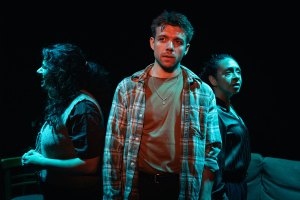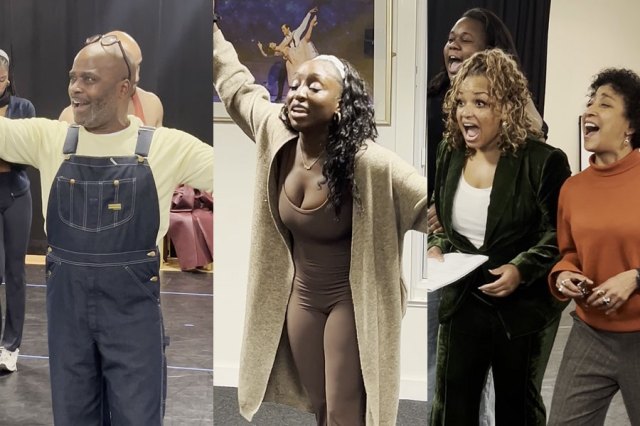Antoinette Nwandu on Pass Over's UK premiere, American reaction and Spike Lee's film adaptation
The playwright talks about her latest work ahead of its opening night at the Kiln Theatre
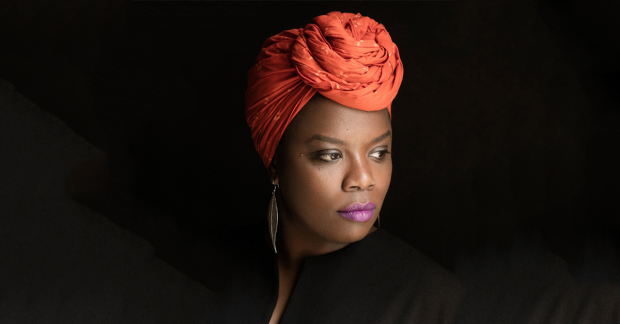
© Beowulf Sheehan
The UK premiere of Antoinette Nwandu's award-winning work Pass Over opens at the Kiln Theatre tomorrow (19 February) and runs until 21 March. This politically charged work fuses the book of Exodus – the second book of both the Torah and the Bible – with Waiting for Godot and modern-day stories taken from the headlines of the last decade.
The American playwright has won the Whiting Award and the Paula Vogel Playwriting Award among others. She had a literary fellowship at the Eugene O'Neill Playwrights Conference and is renowned for writing shows "challenging audiences, critics and the culture at large to think about race, and racism, in new ways", shows that Nwandu herself admits are "confrontational and deeply unsettling by design".
WhatsOnStage caught up with the playwright to talk about writing the show, its reaction and the subsequent film adaptation with Spike Lee:
Tomorrow is the UK premiere of Pass Over coming up – how are you feeling?
I feel incredibly excited and incredibly grateful to Indhu, everyone at the Kiln and everyone in the cast. They have a tricky job because it is a very American play, with American slang and American references and they've been doing such a great job of making it live, understandable and poignant. I'm wonderfully excited.
The way that I think about the play is that there are definitely three layers to the history, the archaeology and the text. There's the Biblical layer, which is epic and universal, a story that's very common and very famous among Judeo-Christian heritage and culture. Then there is the Antebellum slavery layer, which is very specific to the United States – unfortunately in different ways and forms, different cultures have their own versions of that story. Then the modern layer – the hip hop, the accessibility of a modern street language – makes it universal while still being incredibly specific to where we are in the state of the country of the United States.
Not just three layers, but different parts of history as well. What jumped out about these time periods when you were putting the play together?
I grew up in a very conservative church community and so I was very familiar with the Bible. And as a Black American too, learning about civil rights, living through the presidency of Obama, having so many people in my family and my community respond to those elections as though so much justice and hard work and sacrifice had finally been validated and fulfilled. Everything that's happened since that election, it's pushed me away from that hopeful promised land idea that I was raised with, to a more absurdist idea which I encountered later in school and in college. The two very different texts – the Exodus story and Waiting for Godot – they each have such different messages. In one, you're gonna wander in the wilderness for 40 years but you will get to the promised land – that is a promise. Whereas Godot tells us, no if you're waiting for a promise it will never get here. So I needed those two texts to be in conversation with each other.
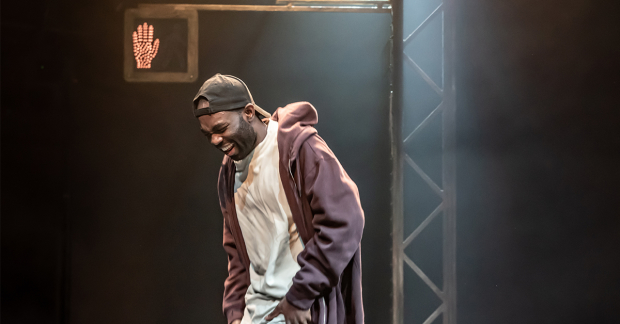
© Marc Brenner
Pass Over first premiered in Chicago in 2017 – did you start writing the play in response to the Trump election?
I actually started during the Obama administration, during the second term when it seemed as though there was fear, an increase in the murder of black men and women – most of them by the police but some of them by the political system, armed citizens who believed in the foolish interpretation of the second amendment. It was for a while, between 2012 and 2015 where every week – if not every day – there was another murder happening. It felt like a play about how many young black men and women were being killed. That's where the anger and the frustration and the questioning came from. The [political] moment felt very much like a promise, but then why was all this violence taking place?
Has the current political climate has given a new nuance to this play?
Absolutely. The underlying emotional and psychological evil – if I'm just gonna be blunt about it – coming from the voters, coming from politicians in both countries [the USA and the UK] and in both cultures is absolutely the same. It's repressive, it's fearful, it's selfish, it's entitled. I do think there's something in this play that resonates in this moment.
After its run in New York, Pass Over went to Sundance Film Festival as a Spike Lee adaptation – how was it to see the work in a different medium?
Spike is such an iconic auteur, what he was able to do is intersplice in audience reactions, so it's its own genre, its own text. I don't think of it as the play, I think of it as its own interpretation and I'm so grateful for it. People who don't get to go to the theatre, people who aren't in big cities… I had someone from Brazil email me and say that he had seen Spike's film. Things like that don't happen in the theatre. And the best version of having something like that online, with a big corporation such as Amazon Prime – which of course is problematic – is that the number of people who have seen it is so much larger because of that version. It's a little astounding!
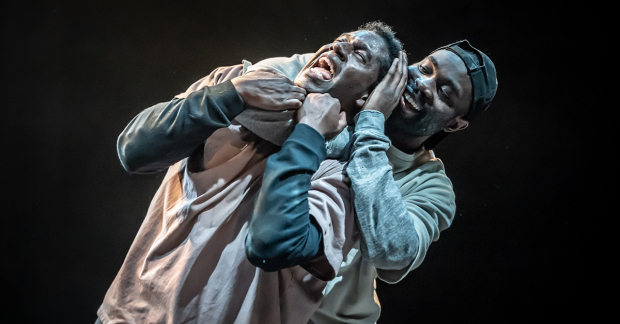
© Marc Brenner
Has the process been any different with Indhu directing this transfer versus with Danya Taymor, who directed both productions in America?
I'm incredibly grateful to have worked with two very empathetic, intuitive, incredibly smart directors. Any time you work with someone new, the process begins again. What's lovely is that I was able to sit in on the first week of rehearsals here if there were any questions about specific cultural references – Indhu is a wonderful collaborator to let me be in the room on that. One of the marks of a great director is that they take take a script and make it live and that's absolutely what she's doing. I'm fortunate that the collaboration is going so well – I was so nervous coming across the pond, 'you don't know these people, are they gonna be ok with this play?' Everybody at the Kiln, the human aspect of it, has been so great. It's such a special theatre, so I feel incredibly privileged to be a part of it. It's the family feel – that's so special and does not happen often!
Has this new cast brought out anything different to the characters that you didn't expect?
Paapa, Gershwyn and Alex are a dream cast. The rhythm in certain places is different, the laughs are falling in different places, there were some lines that I knew would kill with an American audience and here they're a bit more introspective. It's really beautiful to see how the emotional topography of the text is very different. It's unique and it's working in its own way – they're doing such a great job of getting those laughs, making those sharp emotional turns that my work requires. It really is a testament to their acting abilities individually but also their ability to work as an ensemble – it's such an ensemble piece at the end of the day.


















